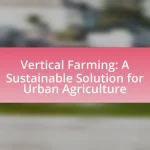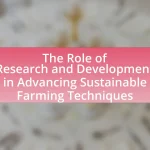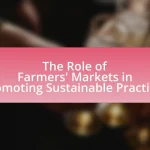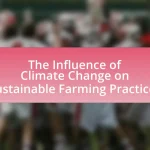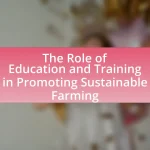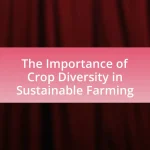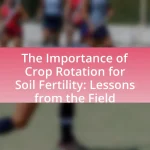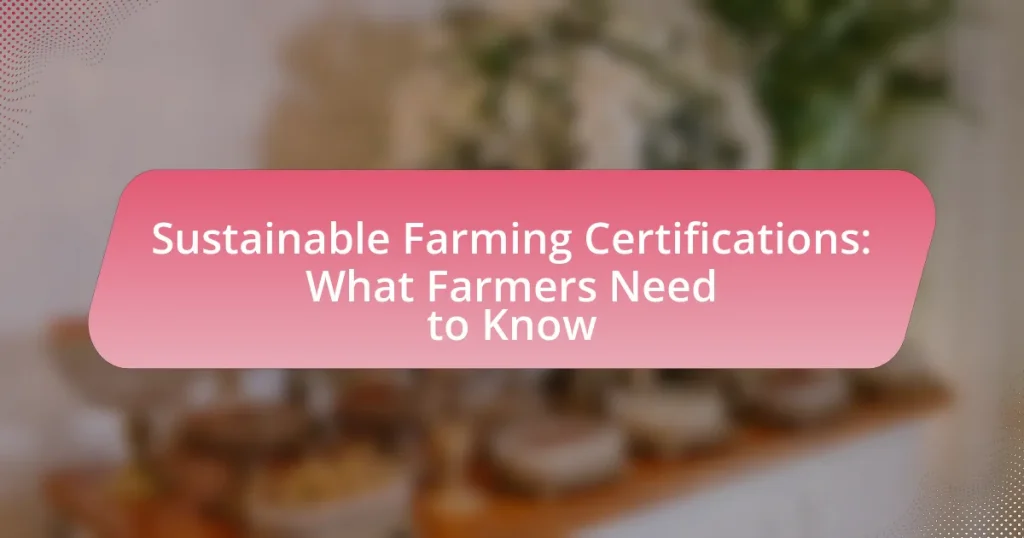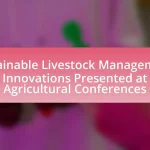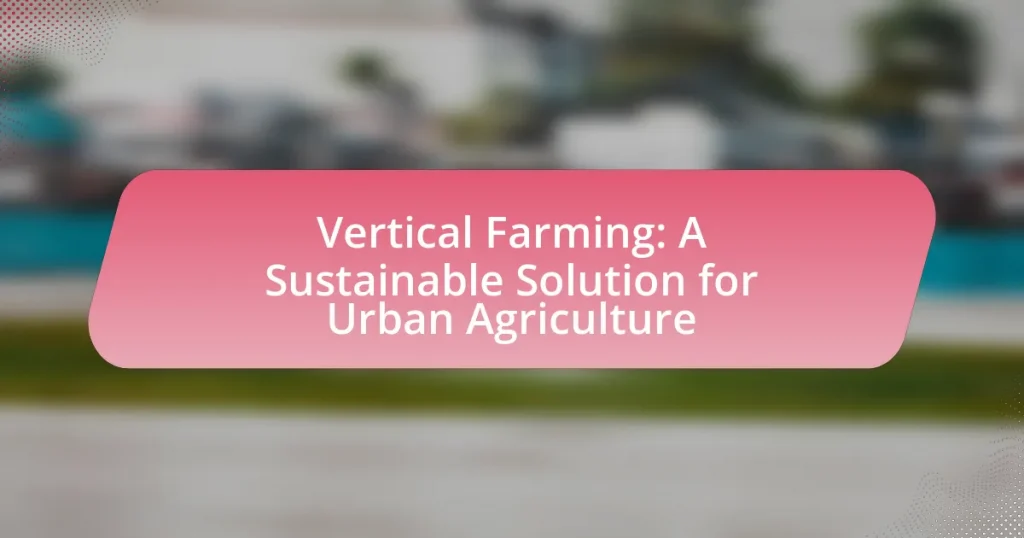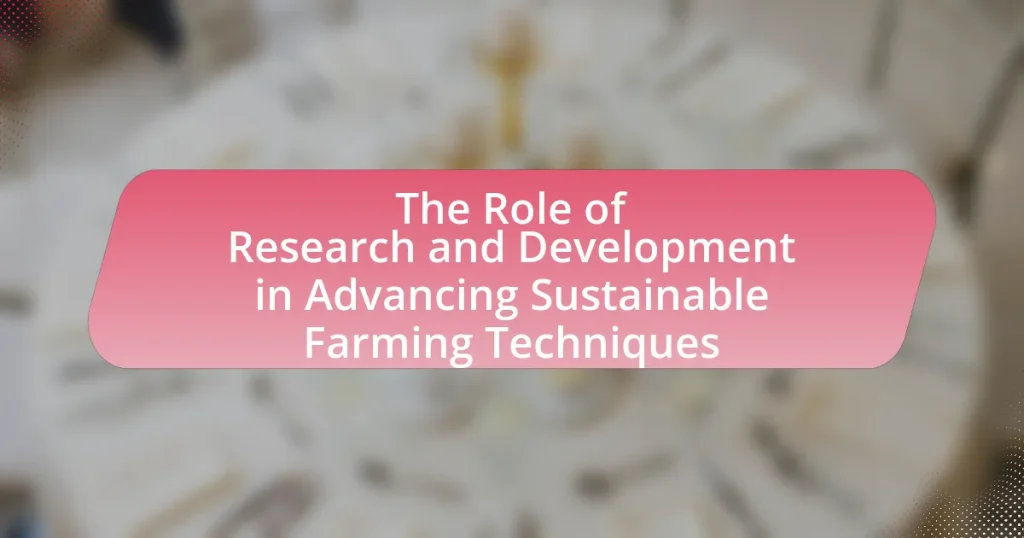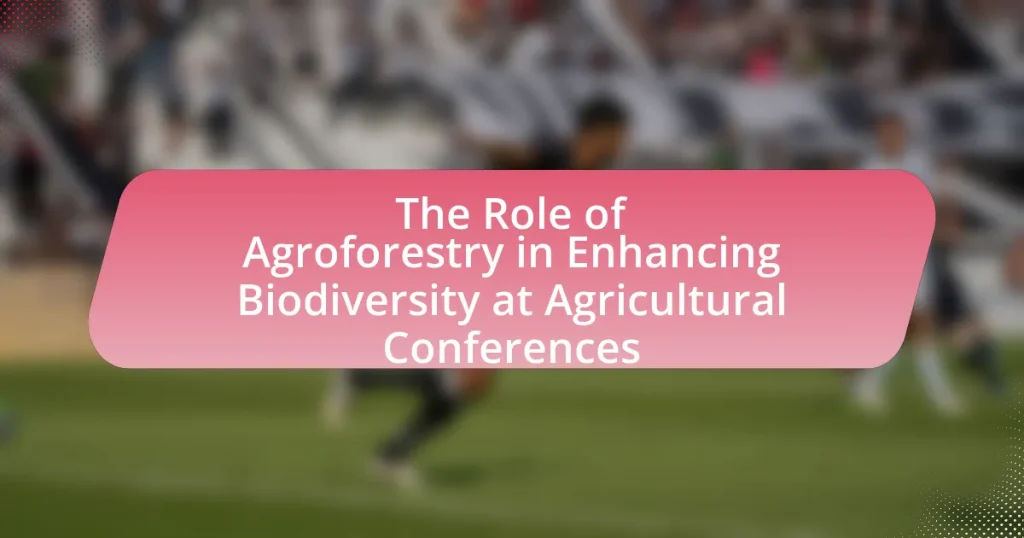Sustainable farming certifications are official recognitions that validate agricultural practices focused on environmental stewardship, social responsibility, and economic viability. This article provides an overview of the importance of these certifications for farmers, detailing how they enhance market access, improve consumer trust, and influence agricultural practices. It discusses various types of certifications, such as USDA Organic and Rainforest Alliance, and outlines the certification process, including the challenges farmers face and strategies to overcome them. Additionally, the article examines the impact of certifications on consumer choices, market dynamics, and future trends in sustainable farming practices.
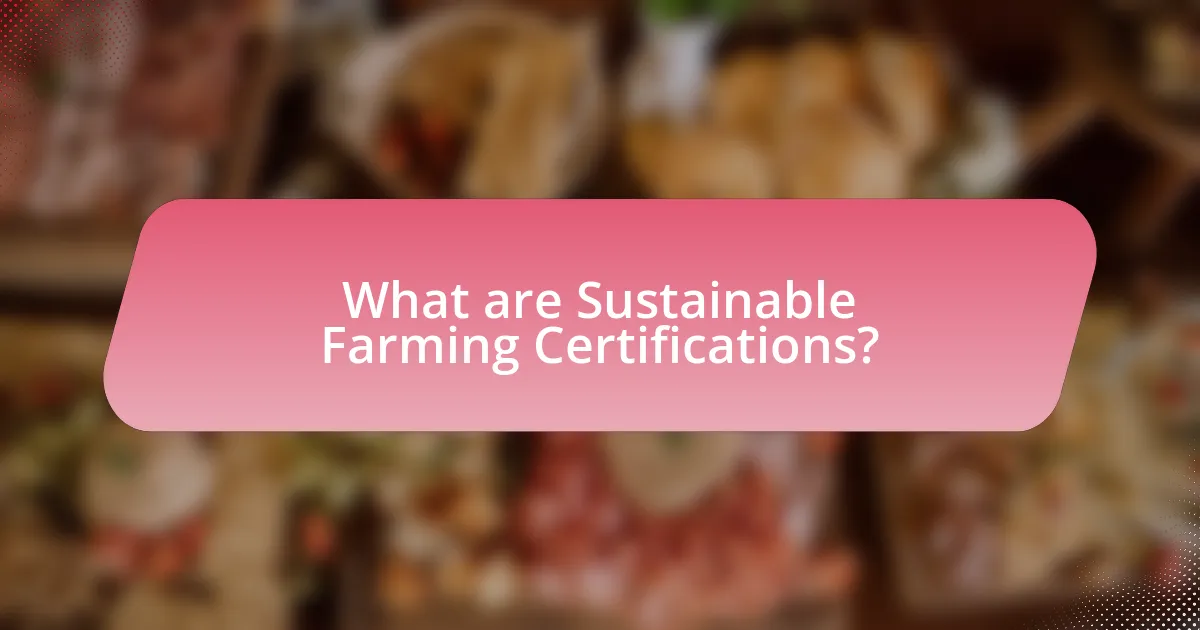
What are Sustainable Farming Certifications?
Sustainable farming certifications are official recognitions that validate agricultural practices aimed at environmental stewardship, social responsibility, and economic viability. These certifications ensure that farming methods adhere to specific sustainability standards, which often include criteria for soil health, water conservation, biodiversity, and fair labor practices. For example, certifications like USDA Organic and Rainforest Alliance require farmers to implement practices that minimize chemical use and promote ecological balance, thereby supporting both the environment and local communities.
Why are Sustainable Farming Certifications important for farmers?
Sustainable Farming Certifications are important for farmers because they enhance market access and improve consumer trust. These certifications signal to consumers that the farming practices meet specific environmental and social standards, which can lead to higher demand for certified products. For instance, a study by the Food and Agriculture Organization found that certified organic products often command a price premium, benefiting farmers financially. Additionally, certifications can help farmers adopt better practices that improve soil health and biodiversity, contributing to long-term sustainability and resilience against climate change.
What impact do these certifications have on agricultural practices?
Sustainable farming certifications significantly enhance agricultural practices by promoting environmentally friendly methods and improving market access for farmers. These certifications, such as USDA Organic or Rainforest Alliance, require adherence to specific standards that reduce chemical usage, conserve water, and protect biodiversity. For instance, a study published in the journal “Agricultural Systems” found that certified organic farms use 30% less energy and have 50% higher soil quality compared to conventional farms. This shift not only benefits the environment but also increases consumer trust and demand for sustainably produced goods, leading to higher prices and better economic outcomes for certified farmers.
How do certifications influence consumer choices?
Certifications significantly influence consumer choices by providing assurance of quality and sustainability. Consumers often rely on certifications as indicators of ethical practices, environmental responsibility, and product safety. For instance, a study by the Hartman Group found that 66% of consumers are willing to pay more for products that are certified organic or sustainably sourced. This willingness is driven by the perception that certified products are healthier and more environmentally friendly, leading to increased trust and preference for brands that display such certifications.
What types of Sustainable Farming Certifications exist?
Various types of sustainable farming certifications exist, including USDA Organic, Rainforest Alliance, Fair Trade, and Certified Naturally Grown. USDA Organic certification ensures that farming practices meet specific organic standards, prohibiting synthetic pesticides and fertilizers. Rainforest Alliance certification focuses on environmental sustainability and social equity, promoting biodiversity and fair labor practices. Fair Trade certification emphasizes equitable trade relationships and sustainable livelihoods for farmers. Certified Naturally Grown is a grassroots alternative to USDA Organic, emphasizing local, sustainable practices without the formal certification process. These certifications provide consumers with assurance regarding the sustainability and ethical practices of their food sources.
What are the most recognized certifications in sustainable farming?
The most recognized certifications in sustainable farming include USDA Organic, Rainforest Alliance Certified, and Fair Trade Certified. USDA Organic certification ensures that farming practices meet strict federal guidelines for organic production, which prohibits synthetic pesticides and fertilizers. Rainforest Alliance Certified focuses on environmental sustainability and social equity, promoting biodiversity and better livelihoods for farmers. Fair Trade Certified emphasizes fair wages and working conditions for farmers, ensuring that they receive a fair price for their products. These certifications are widely acknowledged and help consumers identify sustainably produced goods.
How do different certifications vary in their requirements?
Different certifications vary in their requirements based on specific criteria such as environmental practices, social responsibility, and economic viability. For instance, the USDA Organic certification mandates that farmers adhere to strict guidelines regarding synthetic pesticide use, soil health, and biodiversity, while the Rainforest Alliance certification emphasizes sustainable land management and worker rights. Additionally, the GlobalGAP certification focuses on food safety and traceability, requiring farmers to implement specific practices to ensure product quality. These variations reflect the distinct goals and standards set by each certification body, catering to diverse market demands and consumer preferences.
How can farmers obtain Sustainable Farming Certifications?
Farmers can obtain Sustainable Farming Certifications by adhering to specific guidelines set by certifying organizations, which typically include implementing environmentally friendly practices, maintaining soil health, and ensuring responsible water usage. To achieve certification, farmers must undergo an application process that often involves submitting documentation of their farming practices, undergoing an on-site inspection, and demonstrating compliance with sustainability standards established by organizations such as the USDA Organic, Rainforest Alliance, or GlobalG.A.P. These organizations provide clear criteria and resources to assist farmers in meeting the necessary requirements for certification.
What steps are involved in the certification process?
The certification process for sustainable farming typically involves several key steps: application submission, documentation review, on-site inspection, compliance verification, and certification issuance. Initially, farmers must submit an application detailing their farming practices and adherence to sustainability standards. Following this, a thorough review of the submitted documentation is conducted to ensure all necessary information is provided. An on-site inspection is then performed by a certifying body to assess compliance with the established criteria. After the inspection, the certifying body verifies that all practices meet the required standards before issuing the certification. This structured approach ensures that the certification accurately reflects the farmer’s commitment to sustainable practices.
What documentation is required for certification applications?
Certification applications typically require documentation such as proof of compliance with relevant standards, a completed application form, and records of farming practices. Additional documents may include soil and water testing results, input usage records, and evidence of training or education related to sustainable practices. These requirements ensure that applicants demonstrate adherence to the specific criteria set by the certifying body, which is essential for maintaining the integrity of sustainable farming certifications.
What challenges do farmers face in obtaining certifications?
Farmers face several challenges in obtaining certifications, including complex regulatory requirements, high costs, and time-consuming processes. Regulatory requirements often vary by certification type and region, making it difficult for farmers to navigate the necessary documentation and compliance measures. The financial burden associated with certification fees, training, and potential changes to farming practices can be significant, particularly for small-scale farmers. Additionally, the time required to complete the certification process can delay access to markets that require certified products, impacting farmers’ income and sustainability efforts.
What are common barriers to certification for small-scale farmers?
Common barriers to certification for small-scale farmers include high costs, lack of access to information, and complex regulatory requirements. High costs associated with certification processes can deter small-scale farmers, as they often operate on tight budgets and may not have the financial resources to cover fees and necessary investments. Additionally, many small-scale farmers struggle to access reliable information about certification standards and processes, which can lead to confusion and missteps. Complex regulatory requirements further complicate the certification process, as farmers may lack the technical knowledge or support needed to navigate these regulations effectively. These barriers collectively hinder small-scale farmers from achieving certification, which is essential for accessing premium markets and enhancing sustainability practices.
How can farmers overcome these challenges?
Farmers can overcome challenges related to sustainable farming certifications by adopting best practices in resource management, engaging in continuous education, and collaborating with agricultural organizations. Implementing efficient water usage techniques, such as drip irrigation, can significantly reduce water waste and improve crop yields. Continuous education through workshops and online courses helps farmers stay updated on certification requirements and sustainable practices. Collaboration with organizations like the USDA or local agricultural extension services provides access to resources, funding opportunities, and expert guidance, which can facilitate the certification process and enhance farm sustainability.
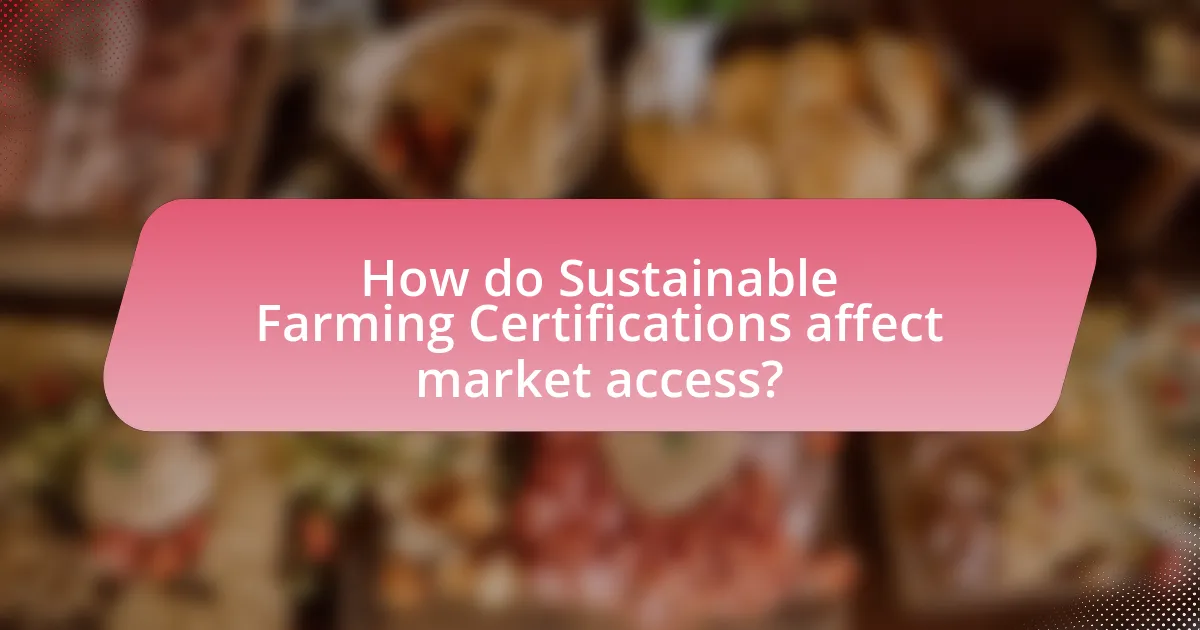
How do Sustainable Farming Certifications affect market access?
Sustainable farming certifications significantly enhance market access for farmers by meeting consumer demand for environmentally friendly and ethically produced goods. These certifications, such as USDA Organic or Rainforest Alliance, provide assurance to consumers and retailers about the sustainability practices employed in production. Research indicates that products with recognized certifications often command higher prices and gain entry into premium markets, as consumers are increasingly willing to pay a premium for sustainably sourced products. For instance, a study by the Organic Trade Association found that organic food sales in the U.S. reached $62 billion in 2020, illustrating the financial benefits of certification. Thus, sustainable farming certifications not only improve market access but also contribute to increased profitability for certified farmers.
What advantages do certified farmers have in the marketplace?
Certified farmers have a competitive edge in the marketplace due to increased consumer trust and access to premium pricing. This trust stems from the assurance that certified products meet specific environmental and safety standards, which is supported by data indicating that 66% of consumers are willing to pay more for sustainably sourced products. Additionally, certified farmers often gain access to niche markets and distribution channels that prioritize sustainability, further enhancing their market position.
How do certifications enhance product value and pricing?
Certifications enhance product value and pricing by providing verified assurance of quality and sustainability, which consumers increasingly demand. For instance, products with organic or fair-trade certifications often command higher prices because they signify adherence to specific standards that promote environmental stewardship and ethical practices. Research indicates that consumers are willing to pay up to 20% more for certified products, reflecting their trust in the certification process and the perceived value of the product. This willingness to pay a premium is supported by a study published in the Journal of Consumer Research, which found that certifications positively influence consumer purchasing decisions by enhancing perceived product quality and brand credibility.
What role do certifications play in accessing niche markets?
Certifications play a crucial role in accessing niche markets by establishing credibility and demonstrating compliance with specific standards. For example, sustainable farming certifications, such as USDA Organic or Rainforest Alliance, signal to consumers that products meet rigorous environmental and ethical criteria, thus attracting a targeted customer base willing to pay premium prices. Research indicates that certified organic products can command prices up to 30% higher than non-certified counterparts, highlighting the financial benefits of accessing these niche markets. Additionally, certifications can enhance market visibility and open distribution channels that prioritize certified products, further solidifying their importance in niche market access.
How do certifications impact relationships with consumers?
Certifications significantly enhance relationships with consumers by establishing trust and credibility. When farmers obtain sustainable farming certifications, they signal to consumers that their practices meet specific environmental and ethical standards. Research indicates that 66% of consumers are willing to pay more for products from certified sustainable sources, demonstrating a direct correlation between certifications and consumer purchasing behavior. This trust leads to increased customer loyalty, as consumers feel more confident in their choices, knowing that certified products align with their values regarding sustainability and ethical farming practices.
What consumer trends are influenced by sustainable certifications?
Sustainable certifications significantly influence consumer trends towards eco-friendly products and ethical purchasing behaviors. Consumers increasingly prefer products that are certified as sustainable, leading to a rise in demand for organic, fair trade, and environmentally friendly goods. According to a 2021 Nielsen report, 73% of global consumers are willing to change their consumption habits to reduce their environmental impact, highlighting the growing importance of sustainability in purchasing decisions. This trend is further supported by the fact that products with recognized sustainable certifications often command higher prices, indicating that consumers are willing to pay a premium for verified sustainable practices.
How can farmers communicate their certification status effectively?
Farmers can communicate their certification status effectively by utilizing clear labeling on products, engaging in direct marketing strategies, and leveraging digital platforms. Clear labeling, such as displaying certification logos on packaging, helps consumers easily identify certified products. Direct marketing strategies, including farm tours and community events, allow farmers to explain their certification processes and benefits directly to consumers. Additionally, digital platforms like social media and websites enable farmers to share their certification status, provide updates, and educate the public about sustainable practices, thereby enhancing transparency and trust.

What are the future trends in Sustainable Farming Certifications?
Future trends in sustainable farming certifications include increased integration of technology, a focus on biodiversity, and enhanced consumer awareness. The adoption of digital tools, such as blockchain and precision agriculture, is expected to streamline certification processes and improve traceability. Additionally, certifications will increasingly emphasize practices that promote biodiversity, responding to growing concerns about ecosystem health. Consumer demand for transparency and sustainability is driving these changes, as evidenced by a 2022 survey indicating that 70% of consumers prefer products with recognized sustainability certifications.
How is technology shaping the certification process?
Technology is significantly shaping the certification process by streamlining data collection and enhancing transparency. Digital platforms enable farmers to easily document and share their practices, ensuring compliance with certification standards. For instance, blockchain technology provides an immutable record of farming practices, which can be verified by certifying bodies, thus increasing trust in the certification process. Additionally, mobile applications allow for real-time monitoring of sustainable practices, making it easier for farmers to maintain their certifications and for certifiers to assess compliance efficiently. This integration of technology not only reduces administrative burdens but also fosters greater accountability and traceability in sustainable farming certifications.
What innovations are emerging in sustainable farming practices?
Innovations emerging in sustainable farming practices include precision agriculture, agroecology, and vertical farming. Precision agriculture utilizes technology such as GPS and IoT sensors to optimize field-level management regarding crop farming. This method has been shown to increase yields by up to 20% while reducing input costs and environmental impact. Agroecology focuses on ecological principles to enhance biodiversity and soil health, leading to more resilient farming systems. Research indicates that agroecological practices can improve food security and reduce greenhouse gas emissions. Vertical farming, which involves growing crops in stacked layers, allows for year-round production with minimal land use and water consumption, demonstrating a potential reduction in resource use by up to 90% compared to traditional farming. These innovations collectively contribute to more sustainable and efficient agricultural practices.
How can farmers leverage technology for better certification outcomes?
Farmers can leverage technology for better certification outcomes by utilizing precision agriculture tools, data analytics, and blockchain technology. Precision agriculture tools, such as GPS-guided equipment and soil sensors, enable farmers to optimize resource use and improve crop yields, which are critical factors in meeting certification standards. Data analytics allows farmers to track and analyze their practices, ensuring compliance with certification requirements and facilitating continuous improvement. Additionally, blockchain technology enhances transparency and traceability in the supply chain, providing verifiable proof of sustainable practices that are often required for certifications. For instance, a study by the Food and Agriculture Organization highlights that the use of precision agriculture can increase productivity by up to 20%, directly impacting certification success.
What are best practices for maintaining certification?
Best practices for maintaining certification include regularly reviewing and adhering to the certification standards, conducting internal audits, and participating in ongoing education and training. Farmers should establish a routine for monitoring compliance with the specific requirements set by the certifying body, which may involve keeping detailed records of practices and inputs used in farming. Engaging in continuous learning through workshops or courses related to sustainable farming can enhance knowledge and ensure that practices remain aligned with evolving standards. Additionally, maintaining open communication with the certifying organization can provide valuable updates and support, ensuring that farmers stay informed about any changes in certification requirements.
How can farmers ensure compliance with certification standards?
Farmers can ensure compliance with certification standards by implementing rigorous record-keeping practices, adhering to specific agricultural guidelines, and undergoing regular audits. Maintaining detailed records of inputs, practices, and outputs allows farmers to demonstrate adherence to standards set by certification bodies. Following established guidelines, such as organic farming practices or sustainable land management techniques, is crucial for meeting certification requirements. Additionally, participating in regular audits conducted by certifying organizations helps verify compliance and identify areas for improvement, ensuring that farmers meet the necessary standards for sustainable farming certifications.
What resources are available for ongoing education and support?
Resources available for ongoing education and support in sustainable farming include agricultural extension services, online courses, workshops, and certification programs. Agricultural extension services provide farmers with access to research-based information and practical advice tailored to local conditions. Online platforms like eXtension and Coursera offer courses on sustainable practices, while organizations such as the Sustainable Agriculture Research and Education (SARE) program provide grants and educational resources. Additionally, local universities often host workshops and field days to enhance farmers’ knowledge and skills in sustainable farming techniques. These resources collectively support continuous learning and adaptation in sustainable agriculture.
What practical tips can farmers follow to succeed with certifications?
Farmers can succeed with certifications by thoroughly understanding the specific requirements of each certification program they pursue. This involves researching the standards set by organizations such as USDA Organic or GlobalGAP, which outline necessary practices and documentation. Additionally, farmers should implement best management practices that align with these standards, such as maintaining detailed records of inputs and practices, which can facilitate compliance during audits. Engaging with local agricultural extension services or certification consultants can provide tailored guidance and support, enhancing the likelihood of successful certification. According to a study published in the Journal of Sustainable Agriculture, farms that actively sought expert advice and maintained rigorous documentation were 30% more likely to achieve certification on their first attempt.
